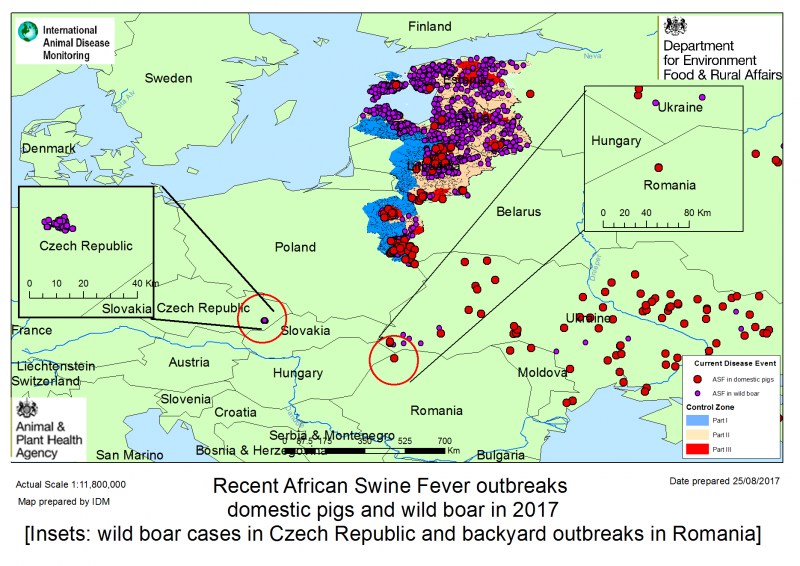Where next for African Swine Fever?
1st Sep 2017 / By Alistair Driver

African swine fever (ASF) is expected to continue its relentless move west via two main pathways, according to the Russian authorities.
The disease has recently been discovered in the Czech Republic, where more than 100 cases are now reported to have been confirmed in wild boar, and Romania. This has prompted Defra and APHA to upgrade the UK's risk level from 'very low' to 'low'.
In his latest article for Pig World, Russian journalist Vladislav Vorotnikov details the situation in Russia, where an outbreak in Siberia is posing a threat to trade talks between Russia and China.
He outlines progress on the development of a vaccine by Russian veterinary scientists and highlights the strange case of how one nation has remained entirely clear of infection, while all around have succumbed.
He also highlights how the Russian authorities expect the disease to continue moving west.
"As for Europe, the Russian veterinary watchdog Rosselkhoznadzor believes ASF will keep moving west via two main pathways," he wrote. "The southerly route, has already seen the virus spread from Ukraine to Moldova. Russian vets believe it could penetrate central Romania, then move to the Balkans, including Bulgaria and Serbia.
"On the northern route, now that ASF has been found in the Czech Republic, Rosselkhoznadzor believes, if it gains a foothold, it is likely to head further west, with Germany next in the firing line."
UK concerns
Romania reported ASF for the first time in Satu Mare in the north of the country in a small backyard herd of four pigs in early August within the enhanced ASF surveillance zone along the Ukraine border. The Romanian authorities blamed imports of meat products from Ukraine as a possible source of infection, although further epidemiological studies will take place.
Global animal health body OIE also recorded multiple outbreaks in Russia, Ukraine, the Czech Republic, Poland and Latvia during August, in a combination of commercial and backyard farms and wild boar.
APHA said the new outbreaks in Romania alongside continuing cases in the Czech Republic, following a big leap west, suggesting human spread via infected meat, and Poland, where outbreaks have been attributed to poor biosecurity with pigs sharing grazing with cattle where wild boar had access, were 'concerning'.
It said: "This signifies a spread in geographic distribution, a possible drop in biosecurity awareness and therefore an increase in the weight of infection in East Europe.
“Despite the relatively low level of trade in live pigs, there could be a substantial movement of people, vehicles and personal imports of pork products, therefore the risk of ASF introduction to the UK has been raised to ‘low’.”
The UK imports only a very small percentage of pig products from the Czech Republic and Romania but Romanian registered vehicles accounted for 12% of traffic through UK ferry ports in the first quarter 2017, second only to Poland.
Key messages to pig keepers
-
Feeding catering waste, kitchen scraps or pork products is illegal under the swill feeding ban
-
Report any clinical signs of suspect disease promptly to a veterinarian
-
Pig keepers and veterinarians should remind themselves of the clinical signs of ASF
-
The main clinical signs are: fever, loss of appetite, lack of energy, sudden death with few signs beforehand
-
Other signs can include: vomiting, diarrhea, red or dark skin on the ears and snout, swollen red eyes, abortions, still-births and weak litters
-
Anybody returning from affected countries should avoid contact with domestic pigs and areas with feral pigs or wild boar until they are confident they have no contaminated clothing or equipment
-
For more see https://www.gov.uk/guidance/african-swine-fever